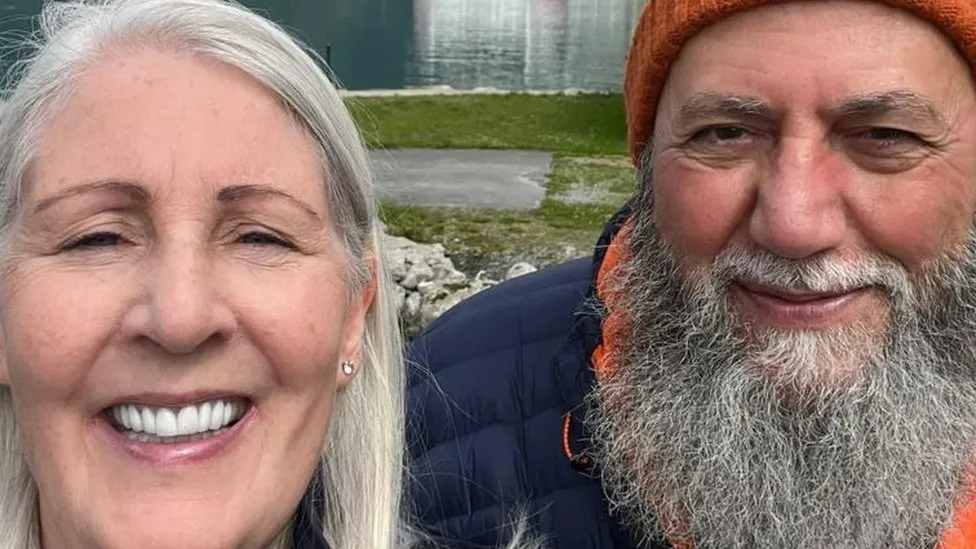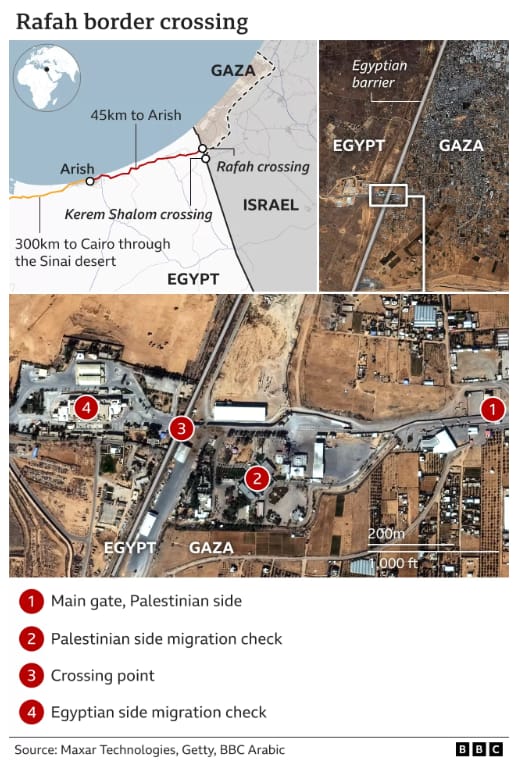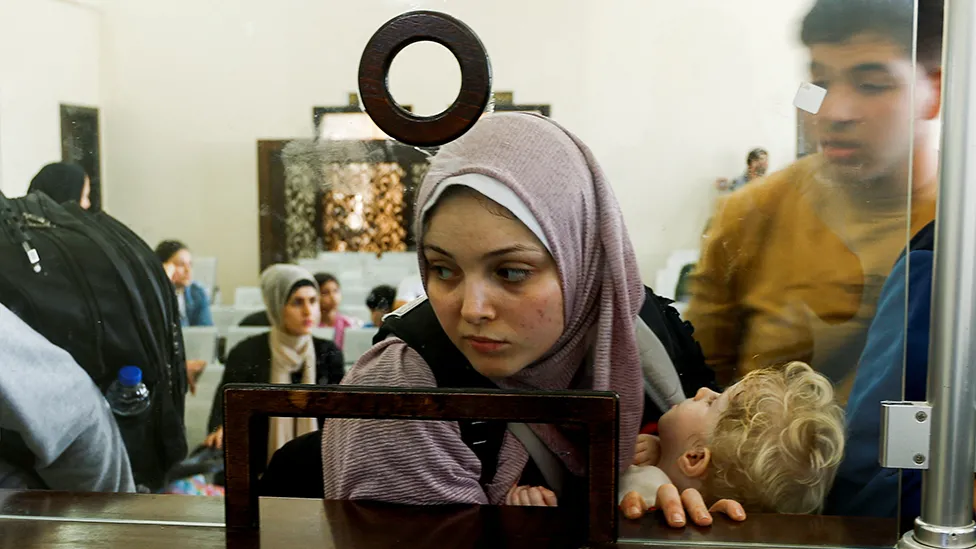More British citizens have begun to leave the Gaza Strip, after Palestinian authorities listed nearly 100 as being eligible to cross to Egypt on Friday.
The UK section of the Palestinian border authority list names more than 90 people as British nationals.
Foreign Secretary James Cleverly said “a number” of Britons were leaving Gaza, a development he described as “positive news”.
Mr Cleverly did not provide a figure for how many have left.
He added the UK “will continue to work with” authorities in the region to ensure as many Britons “as possible” can leave Gaza.
The BBC is aware of at least 19 people named on the list who are unable to leave via the Rafah crossing.
Three family groups have said they are located in the north of Gaza but it is too dangerous to travel to the south where the crossing is located.
The parents-in-law of Scottish First Minister Humza Yousaf, trapped in Gaza since 7 October, have left, but said they were “severely traumatised”.
Among the first to arrive back in the UK was Dr Abdelkader Hammad, a surgeon in Liverpool, who said it was a “big, big relief” to walk through the doors at Heathrow on Friday evening and see his family.
“It has been four weeks waiting for this moment really to happen, and, I mean at some stage I wasn’t sure this would happen really,” he said,”but thanks god I am here.”
He said whole neighbourhoods in Gaza had been levelled and said you could “smell death”, with many bodies still under the rubble.
Border crossings in and out of Gaza have been closed since 7 October, when Hamas, which is a proscribed terrorist organisation in the UK, attacked Israel, killing more than 1,400 people and taking more than 240 hostage.
Since then, the Israeli military has launched a massive bombing campaign on Gaza, placed the strip under a “complete siege” and recently launched a ground assault on the north of Gaza. The Hamas-run health ministry in Gaza says more than 9,000 people have been killed.
Mr Cleverly said his office had not been informed of any British nationals killed in Gaza, but that the flow of information was often interrupted, delayed, or contradictory information was received.
About 200 British nationals were believed to be in Gaza before war broke out.
A small number have already left Gaza after some foreign nationals and injured Palestinian people began to be allowed to go through the crossing into Egypt for the first time from Wednesday.
Ibrahim Assalia, a British national who travelled to Gaza with his wife and children three months ago after his father was diagnosed with cancer, was on Friday’s list but could not get to Rafah.
He said his family is unable to get to the border, as Israeli tanks have cut off the routes to the Rafah crossing and are “shelling every civilian car that passes through”.
Mr Assalia told BBC Radio 4’s World at One programme a family of 10 people was killed on Thursday trying to get to the border, adding: “We don’t sleep, the kids cry. We hate every minute.”
The Foreign Office has said it does not comment on individual cases, but added it is working at “every level of government to ensure British nationals can leave”.
The Israeli military is yet to respond to the BBC on claims civilians are being fired upon, but has previously said it does not target civilians.

The UK section of the list published by Palestinian authorities contains 127 names, with 92 listed as being British nationals. But it is not clear if the others, the vast majority of whom are described as Palestinian, also hold dual citizenship.
Humza Yousaf’s parents-in-law Elizabeth and Maged El-Nakla, who live in Dundee, have made it to Egypt after becoming trapped in Gaza while visiting relatives before the borders closed.
In a statement on Friday, the first minister and his wife Nadia confirmed her parents had left and expressed gratitude to people who have helped them, including the Foreign Office crisis team.
“These last four weeks have been a living nightmare for our family, we are so thankful for all of the messages of comfort and prayers that we have received from across the world, and indeed from across the political spectrum in Scotland and the UK,” they said.
Speaking on Friday, security minister Tom Tugendhat said the British government was being “very cautious” about giving an exact number of people who will be able to get out because “we neither control the border, nor do we control what’s going on inside Gaza”.
“So what we don’t want to do is give false hope or false belief to individuals that they’ll be able to cross today,” he told BBC Breakfast.

The UK has deployed a Border Force team in Cairo, as well as consular officials in Arish, near Rafah, to provide support for UK nationals after leaving Gaza.
Surgeon Abdelkadar Hammad, who lives in Liverpool, was among those who were able to exit via the Rafah crossing into Egypt on Thursday, his family have said.
Downing Street previously confirmed that two UK aid workers were among those to make it through Rafah, which is the only Gazan border crossing not controlled by Israel.
On Thursday, the Foreign Office said more British nationals had managed to pass through the Gaza-Egypt border, but did not confirm how many.
A dual UK-US citizen who left Gaza on Thursday with her family has told the BBC an exception was made for her British-Palestinian husband at the border as he was with family on the list of US citizens eligible to leave.
Dr Emilee Rauschenberger, an academic who lives in Salford, described the situation at Rafah as chaotic, with many people struggling to make it to the far-south of Gaza without cars or access to other transport.
She told BBC Radio 4’s Today programme on Friday there was no system to divide people who were eligible to leave and those not on a list but hoping to cross, creating a stressful situation.
After waiting many hours on the Gazan side of the border crossing, the family made it through to Egypt where they were given food and water and seen by medical staff.
Dr Rauschenberger said British embassy staff in Egypt told her about 10 British citizens, who she believes work for aid agencies or other international organisations, also crossed on Thursday.
The UK government has given both the Israeli and Egyptian authorities a list of British citizens and their dependants, prioritised by their medical vulnerability.
Dr Ahmed Abou Foul, who is based in Birmingham, has told the BBC that 16 members of his family who are trying to leave Gaza are on the list, including eight children.
He says he has mixed feelings about the news because two young children and their mothers, his sisters-in-law, will not be be able to leave as their names are not on the list.
Dr Abou Foul told BBC Breakfast on Friday the family do not know why they have been excluded, as he said they had been given assurances from the Foreign Office.
Source: Rafah crossing: More Britons leave after nearly 100 listed as eligible – BBC News
